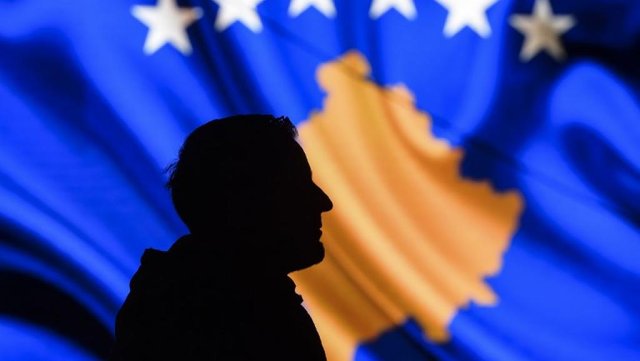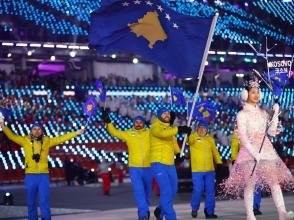Kosovo: 10 years of unfinished independence

The small landlocked state of the Balkans celebrates its ten years of independence this Saturday, February 17th. But part of the Kosovo Serb minority still rejects the Kosovar state and the diplomatic conflict with Belgrade is recurrent. Kosovo, a developing state, sovereignty still under construction and a society still divided.

It was a week ago. The hymn of Kosovo echoed the opening ceremony of the Olympic Games. A big first: the country had never sent athletes to the Winter Olympics. First steps that have not really been successful: skier Albin Tahiri finished last in the combined event. It does not matter to Pristina: the symbol was there and the government gave it a lot of coverage on television and on social networks. And for good reason: the colors yellow and blue of the country in the Olympic enclosure, it is also for Kosovo a sign of integration in the concert of the nations.
A rare sign: 23 out of 28 countries in the EU recognize this small landlocked state, 115 in the world. It is not enough to sit at the United Nations. In any case, the country stumbles on another obstacle: Chinese and Russian vetoes. With every vote on entry into an international institution, Moscow supports Belgrade in its diplomatic guerrilla war against its former province. Kosovo is not a member of Unesco and, a few months ago, withdrew its application for Interpol.
A sovereignty to build
Marginalized in international institutions, Kosovo also has a fragile and inefficient economy: nearly one in six people lives below the poverty line (figures from its national agency). In economic difficulty, Kosovo is still in fact a state whose sovereignty is to be built. It is blatant on the regal files like the justice and the defense. Justice ? " Magistrates and specialists in criminal law, particularly from the European Union, continue to go to Kosovo to assist the Ministry of Justice or the courts that try crimes to assist them, with the aim of being in tune with a European standard, to avoid as much as possible the corruption of justice "Says Joseph Krulic, jurist historian and teacher at the University of Paris-Est.
Defense ? Here too, Kosovo is far from being able to assume alone. Joseph Krulic points out: " If you have 3 000 or 5 000 men who come from an old militia that fought in 1999 (NB: the conflict between Serb forces and Kosovar independence rebels of the Kosovo Liberation Army, 'UÇK), you can not protect a state of 10,900 square kilometers that theoretically has 2 million people against an army that could have 100 or 200,000 men. In concrete terms, the territorial survival of Kosovo depends on a NATO guarantee .
Pristina authority challenged
On its own territory, Pristina's authority is also disputed and fragmented. 120,000 Serbs (an estimate since the minority refused to submit to the last census in 2011) live in this country of 1.8 million inhabitants. Some 120,000 people who often live in enclaves or live as in Mitrovica: a city still cut in half by a bridge between Serbs and Albanians. The tensions are still there. The murders also: on January 16th, a Serbian leader was shot down six bullets in North Mitrovica, the Serbian zone of the city. Being a moderate among the representatives of the Serb minority, he was 64 years old one of the few members of his community to speak Albanian and tried to build bridges between the two communities. A few months before, Oliver Ivanovic alerted about the climate of " danger and fear ". The inhabitants of North Mitrovica do not " fear the Albanians ", he declared: " But the Serbs, local bullies and criminals who wander in 4 × 4 without a license plate ".
There is also the temptation to refuse that justice passes. Two months ago, MPs even tried to repeal the international war crimes tribunal charged to the KLA: " This attempt is not totally aborted. The amendment to Parliament has not been withdrawn, it would require that the 43 members who initiated it withdraw their signature. Except that for the moment we do not really see any political pressure for this to happen. The leaders of this country must understand that they have taken a dangerous step, that the country is itself put in a difficult situation: how to convince the European institutions after this gesture that Pristina is a reliable partner with which we can put in place a stable relationship? "Says Natalia Apostolova, representative of the European Union in Kosovo.
All these doubts about the willingness to give pledges further delay the possibility of integration into the European Union. Even the simple possibility of visas to travel. The youth of this landlocked state looking for a future feels hijacked by a ruling class that does not find the way out of the political and economic crisis: half of the under-24 is unemployed. Today 700 000 Kosovars, almost a third of the population has taken the road of exile and lives abroad.